UK Release date : Monday, April 26, 1982
Tug Of War
By Paul McCartney • Official album • Part of the collection “Paul McCartney • Studio albums”
Last updated on August 2, 2023
UK Release date : Monday, April 26, 1982
By Paul McCartney • Official album • Part of the collection “Paul McCartney • Studio albums”
Last updated on August 2, 2023
Previous album Nov 20, 1981 • "Stop and Smell the Roses" by Ringo Starr released in the UK
Session Apr 14 - 16, 1982 • Recording "The Girl Is Mine"
Interview Apr 20, 1982 • Paul McCartney interview for Los Angeles Times
Album Apr 26, 1982 • "Tug Of War" by Paul McCartney released in the UK
Album Apr 26, 1982 • "Tug Of War" by Paul McCartney released in the US
Interview May 03, 1982 • Paul McCartney interview for Newsweek
This album was recorded during the following studio sessions:
Written by Paul McCartney
4:22 • Studio version • A
Paul McCartney : Acoustic guitar, Arrangement, Backing vocals, Bass, Drums, Electric guitar, Synthesizers, Vocal Linda McCartney : Backing vocals Denny Laine : Electric guitar Eric Stewart : Backing vocals, Electric guitar George Martin : Arrangement, Producer Geoff Emerick : Mixing engineer, Recording engineer Campbell Maloney : Military snares Kenneth Sillito : Orchestra lead, Violin Jon Jacobs : Assistant mixing engineer, Assistant recording engineer Keith Harvey : Cello John Underwood : Viola Patrick Halling : Violin Dennis Vigay : Cello Laurie Lewis : Violin Mike Stavrou : Assistant recording engineer Alan John Peters : Violin Galina Solodchin : Violin Michael Rennie : Violin George Turnlund : Viola Ken Essex : Viola Alexander Kok : Cello Peter Willison : Cello David Ogden : Violin Nicolas Reader : Bassoon
Session Recording: Jan 21, 1981 • Studio Parkgate Studio, Sussex, UK
Session Recording: Mar 01, 1981 • Studio AIR Studios, Montserrat
Session Overdubs: March - December 1981 • Studio AIR Studios, London, UK
Session Mixing: Dec 13, 1981 • Studio AIR Studios, London, UK
Written by Paul McCartney
4:16 • Studio version • A
Paul McCartney : Acoustic guitar, Arrangements, Backing vocals, Bass, Piano, Vocal Linda McCartney : Backing vocals Ringo Starr : Drums Eric Stewart : Backing vocals, Guitar George Martin : Arrangements, Electric piano, Producer Geoff Emerick : Mixing engineer, Recording engineer Steve Gadd : Drums Jon Jacobs : Assistant mixing engineer, Assistant recording engineer Mike Stavrou : Assistant recording engineer Unknown musician(s) : Horns
Session Recording: Feb 16-18, 1981 • Studio AIR Studios, Montserrat
Session Overdubs: Mar 23, 1981 • Studio AIR Studios, London, UK
Session Mixing: December 1981 • Studio AIR Studios, London, UK
Written by Paul McCartney
3:19 • Studio version • A
Paul McCartney : Acoustic guitar, Arrangement, Backing vocals, Spanish guitar, Vocal Linda McCartney : Backing vocals Denny Laine : Electric guitar, Synthesizer Stanley Clarke : Bass Eric Stewart : Backing vocals George Martin : Arrangement, Producer Geoff Emerick : Mixing engineer, Recording engineer Steve Gadd : Drums, Percussion Jon Jacobs : Assistant mixing engineer, Assistant recording engineer Adrian Brett : Pan pipes Mike Stavrou : Assistant recording engineer
Session Recording: Feb 09, 1981 • Studio AIR Studios, Montserrat
Session Overdubs: July 1981 • Studio AIR Studios, London, UK
Session Mixing: Sep 01, 1981 • Studio AIR Studios, London, UK
Written by Paul McCartney, Stevie Wonder
6:23 • Studio version • A
Paul McCartney : Arrangement, Backing vocals, Bass, Drums, Electric guitar, Vocals Linda McCartney : Backing vocals Stevie Wonder : Synthesizer, Vocals Eric Stewart : Backing vocals, Recording engineer George Martin : Arrangement, Producer Geoff Emerick : Mixing engineer, Recording engineer Jon Jacobs : Assistant mixing engineer, Assistant recording engineer Andy Mackay : Lyricom Mike Stavrou : Assistant recording engineer Wonderlove : Backing vocals
Session Recording: Mar 01, 1981 • Studio AIR Studios, Montserrat
Session Overdubs: March 1981 • Studio Strawberry Studios South, Dorkins, Surrey
Session Overdubs: August 1981 • Studio AIR Studios, London
Session Mixing: Oct 01, 1981 • Studio AIR Studios, London, UK
Written by Paul McCartney
2:29 • Studio version • A
Paul McCartney : Arrangement, Guitar, Vocals George Martin : Arrangement, Producer Jack Rothstein : Violin Bertrand Partridge : Violin Ian Jewel : Viola Keith Harvey : Cello Jon Kelly : Recording engineer John Underwood : Viola Patrick Halling : Violin Dennis Vigay : Cello Laurie Lewis : Violin Alan John Peters : Violin Galina Solodchin : Violin Michael Rennie : Violin George Turnlund : Viola Ken Essex : Viola Alexander Kok : Cello Peter Willison : Cello Renate Blauel : Second engineer
Session Recording: Nov 30, 1981 • Studio AIR Studios, London, UK
Session Mixing: Dec 09, 1981 • Studio Odyssey Studios, London
Written by Paul McCartney
4:08 • Studio version • A
Paul McCartney : Arrangement, Backing vocals, Bass, Drums, Electric guitar, Percussion, Piano, Vocal Linda McCartney : Backing vocals, Piano Denny Laine : Electric guitar Ringo Starr : Drums Eric Stewart : Backing vocals George Martin : Arrangement, Producer Geoff Emerick : Mixing engineer, Recording engineer Jon Jacobs : Assistant mixing engineer, Assistant recording engineer John Barclay : Horn Jack Brymer : Clarinet gliss Peter Marshall : Narration Chris Spedding : Guitar David Ogden : Violin David Willis : Saxophone Raymond Swinfield : Saxophone Thomas Whittle : Horn
Session Recording: Jan 02, 1981 • Studio Parkgate Studio, Sussex, UK
Session Overdubs: Dec 14, 1980 • Studio AIR Studios, London, UK
Session Overdubs: Mar 17, 1981 • Studio AIR Studios, London, UK
Session Mixing: Oct 01, 1981 • Studio AIR Studios, London, UK
Written by Paul McCartney
2:55 • Studio version • A
Paul McCartney : Acoustic guitar, Arrangement, Backing vocals, Electric guitar, Synthesizers, Vocal Linda McCartney : Backing vocals Denny Laine : Acoustic guitar Stanley Clarke : Bass Eric Stewart : Backing vocals George Martin : Arrangement, Producer Geoff Emerick : Mixing engineer, Recording engineer Jon Jacobs : Assistant mixing engineer, Assistant recording engineer Mike Stavrou : Assistant recording engineer
Session Recording: Feb 04, 1981 • Studio AIR Studios, Montserrat
Session Recording: Feb 10, 1981 • Studio AIR Studios, Montserrat
Session Overdubs: Mar 12, 1981 • Studio AIR Studios, London, UK
Session Mixing: Sep 01, 1981 • Studio AIR Studios, London, UK
Written by Paul McCartney
3:49 • Studio version • A
Paul McCartney : Acoustic guitar, Arrangement, Backing vocals, Bass, Piano, Vocals Linda McCartney : Backing vocals Denny Laine : Bass Ringo Starr : Drums Eric Stewart : Backing vocals George Martin : Arrangement, Producer Geoff Emerick : Mixing engineer, Recording engineer Jon Jacobs : Assistant mixing engineer, Assistant recording engineer Keith Harvey : Cello Adrian Sheppard : Drums, Percussion Philip Jones : Trumpet (?) John Underwood : Viola Patrick Halling : Violin Dennis Vigay : Cello Laurie Lewis : Violin Galina Solodchin : Violin Michael Rennie : Violin George Turnlund : Viola Ken Essex : Viola Alexander Kok : Cello Peter Willison : Cello Alan Peters : Violin David Ogden : Violin Jeff Bryant : French horn (?) Philip Jones Brass Ensemble : Brass instruments Paul Archibald : Trumpet (?) James Watson : Trumpet (?) Michael Thompson : French horn (?) John Pigneguy : French horn (?) Raymond Premu : Bass trombone (?)
Session Recording: Jan 02, 1981 • Studio Parkgate Studio, Sussex, UK
Session Recording: July 1981 • Studio AIR Studios, London
Session Mixing: Oct 01, 1981 • Studio AIR Studios, London, UK
Written by Paul McCartney
2:29 • Studio version • A
Paul McCartney : Acoustic guitar, Arrangement, Bass, Percussion, Synthesizers, Vocals Carl Perkins : Electric guitar, Vocal George Martin : Arrangement, Producer Geoff Emerick : Mixing engineer, Recording engineer Jon Jacobs : Assistant mixing engineer, Assistant recording engineer Mike Stavrou : Assistant recording engineer
Session Recording: Feb 24, 1981 • Studio AIR Studios, Montserrat
Session Mixing: Oct 01, 1981 • Studio AIR Studios, London, UK
Written by Paul McCartney
0:34 • Studio version • A
Paul McCartney : Arrangement, Guitar, Vocals, Vocoder George Martin : Arrangement, Producer Geoff Emerick : Mixing engineer, Recording engineer Jon Jacobs : Mixing engineer assistant, Recording engineer assistant
Session Recording and mixing: Dec 29, 1981 • Studio AIR Studios, London, UK
Written by Paul McCartney
2:43 • Studio version • A
Paul McCartney : Arrangement, Backing vocals, Bass, Guitars, Vocal Linda McCartney : Backing vocals Denny Laine : Electric guitar, Synthesizer Eric Stewart : Backing vocals George Martin : Arrangement, Electric piano, Producer Geoff Emerick : Mixing engineer, Recording engineer Dave Mattacks : Drums, Percussion Jon Jacobs : Assistant mixing engineer, Assistant recording engineer Mike Stavrou : Assistant recording engineer
Session Recording: Feb 04, 1981 • Studio AIR Studios, Montserrat
Session Overdubs: Mar 23, 1981 • Studio AIR Studios, London, UK
Session Mixing: Aug 14, 1981 • Studio AIR Studios, London, UK
Written by Paul McCartney
3:43 • Studio version • A
Paul McCartney : Arrangement, Backing vocals, Bass, Guitar, Percussion, Piano, Synthesizers, Vocals, Vocoder Stevie Wonder : Backing vocals, Drums, Electric piano, Percussion, Synthesizers, Vocals George Martin : Arrangement, Producer Geoff Emerick : Mixing engineer, Recording engineer Jon Jacobs : Assistant mixing engineer, Assistant recording engineer Mike Stavrou : Assistant recording engineer
Session Recording: Feb 28, 1981 • Studio AIR Studios, Montserrat
Session Overdubs: Mar 30, 1981 • Studio AIR Studios, London, UK
Session Overdubs: October 1981 • Studio Strawberry Studios South, Dorkins, Surrey
Session Mixing: Jan 19, 1982 • Studio AIR Studios, London, UK
From Wikipedia:
Tug of War is the third solo studio album by Paul McCartney, released in April 1982. It was McCartney’s first album released after the dissolution of Wings in April 1981. The album was produced by former Beatles producer George Martin and was a number #1 in numerous countries.
Recording
Following the release of the solo album McCartney II, Wings regrouped in July and October 1980 to rehearse several songs which later appeared on Tug of War and Pipes of Peace. Feeling the need for direction, McCartney called upon his old producer, George Martin, to begin recording a song written for the animated Rupert Bear character (to which McCartney owned the rights), entitled “We All Stand Together“, among others. The productive sessions continued until 9 December, the morning McCartney woke up to discover his old songwriting partner and fellow ex-Beatle, John Lennon, had been shot and killed the night before in New York City. Abandoning that day’s session part-way through (where he and Denny Laine were recording future B-Side “Rainclouds”), both Martin and McCartney felt it was best to leave the project for the time being and start anew once they were ready.
In February 1981, two months after Lennon’s death, Paul McCartney resumed his sessions, recording that month with Stevie Wonder, Stanley Clarke, Carl Perkins and Ringo Starr and laying down several songs in the process. The recordings were held at AIR Studios in Montserrat, in the Caribbean and lasted from 3 February to 2 March, ending with Ebony and Ivory and What’s That You’re Doing, two songs featuring Stevie Wonder. 10cc guitarist Eric Stewart also became a frequent collaborator of McCartney’s during this era. Further sessions that summer were also undertaken at George Martin’s AIR studios at Oxford Street, London – with the producer manning the controls and giving McCartney’s music the benefit of 1980s technology. The sessions were so productive that several of its tracks would be held over for the next album, Pipes of Peace, which followed in 1983. The rest of 1981 would be spent in a quiet fashion, with McCartney and Martin touching up the album and perfecting it.
Release, critical reception and aftermath
In a contemporary review for Rolling Stone, music critic Stephen Holden hailed Tug of War as “the masterpiece everyone has always known Paul McCartney could make“, particularly because of its vivid music and consistent songwriting. Robert Palmer was less enthusiastic in his review for The New York Times and found the album “exquisitely crafted though lyrically flawed“, as he thought McCartney’s lyrics were often “cliched or mawkish,” but that the album “at its best, is as finely crafted as his work with the Beatles.“
In March 1982, McCartney’s duet with Stevie Wonder, “Ebony and Ivory“, was released to great commercial success, reaching number one in many countries. Consequently, when Tug of War appeared in April, it was an worldwide number one, selling several million copies and did much to restore McCartney’s critical reputation after what was viewed as a lean period for him. Tug of War was nominated for the “Album of the Year” Grammy in 1983. The follow-up single “Take It Away” was a US Top 10 entry as well.
The album was issued in the US on compact disc on 29 February 1984. In 1993, Tug of War was remastered and re-issued on CD as part of “The Paul McCartney Collection” series. There were no bonus tracks: “Rainclouds” and “I’ll Give You a Ring“, B-sides of “Ebony and Ivory” and “Take It Away“, respectively, were omitted. In 2007, Tug of War was remastered and re-released on the iTunes Store adding a solo version of “Ebony and Ivory”.
Another reissue was released on 2 October 2015, as part of the Paul McCartney Archive Collection. This edition included a remixed version of the album, along with the original mix, and a series of videos. […]

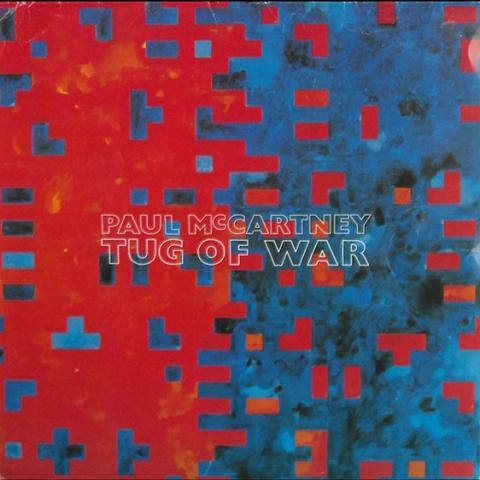
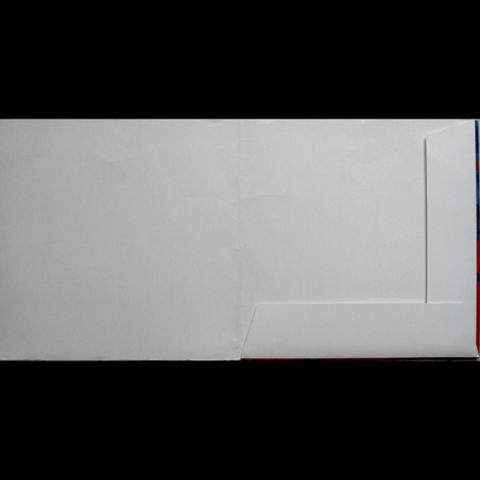

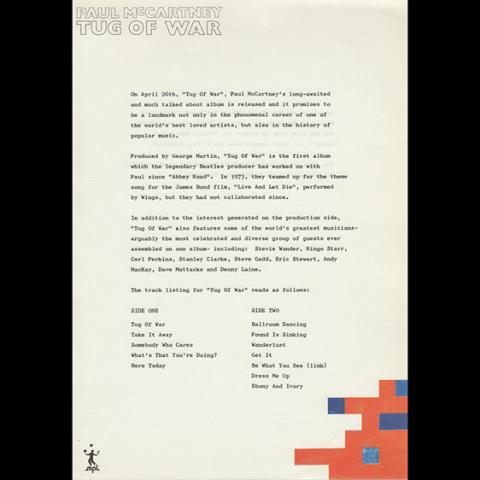
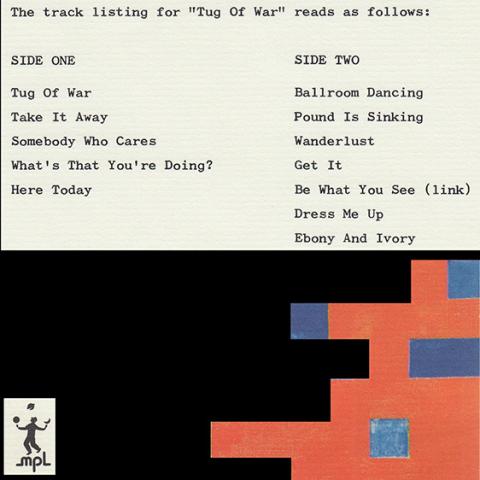
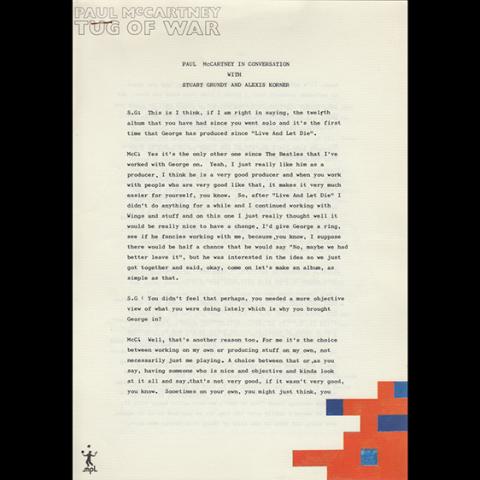
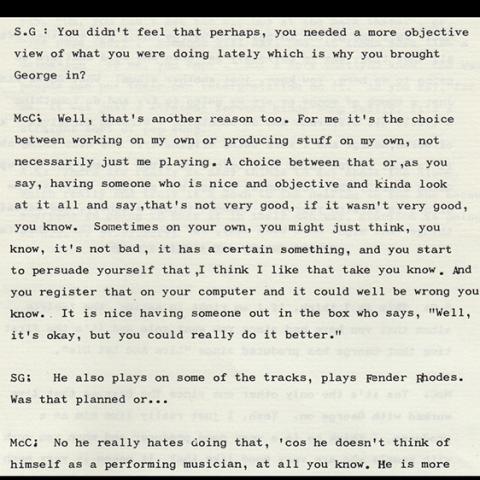
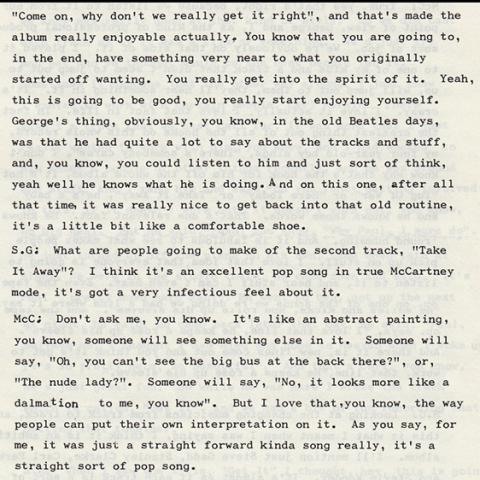

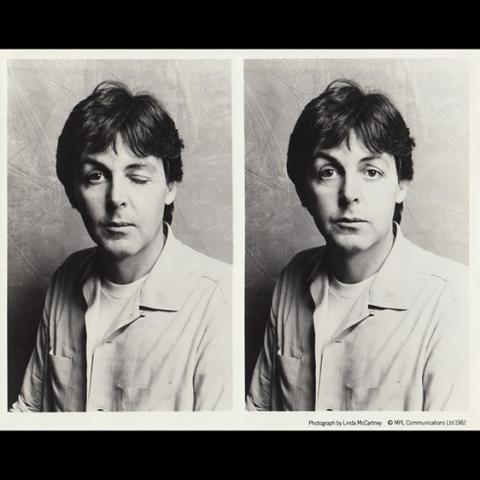
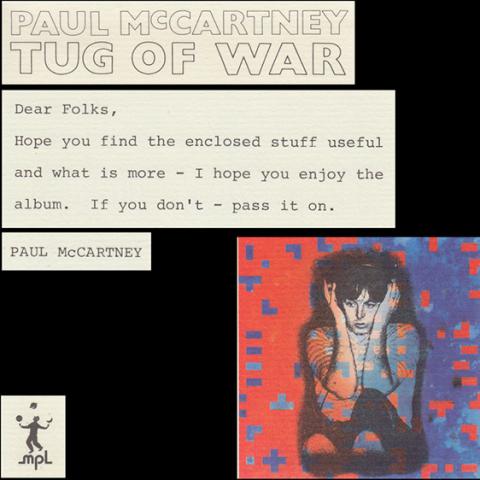

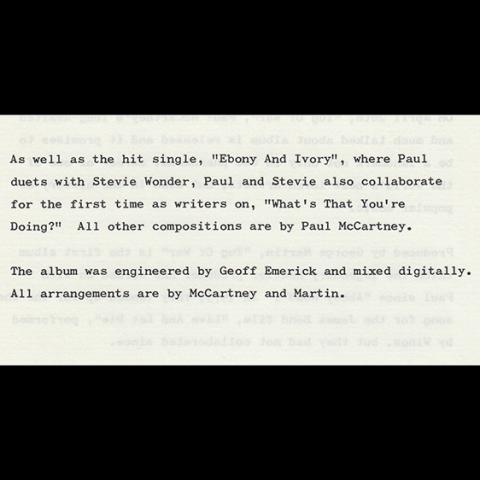
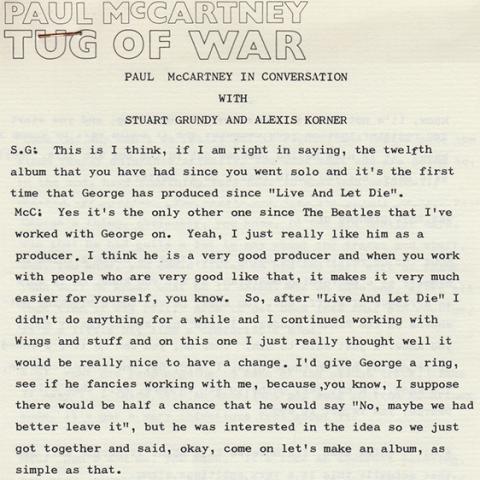
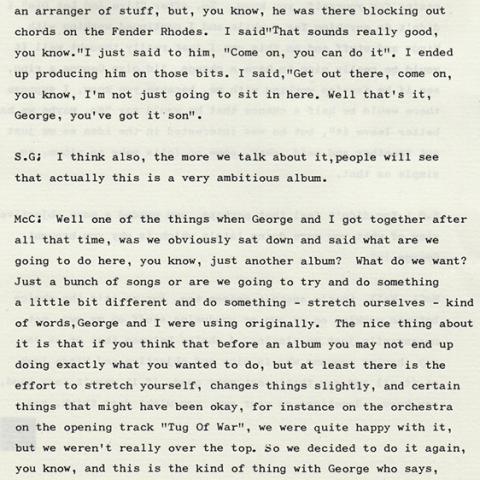

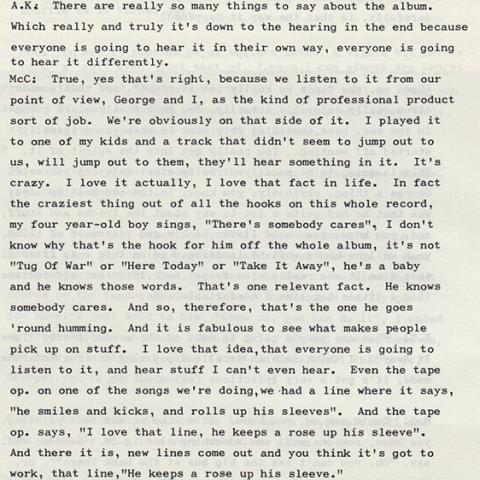
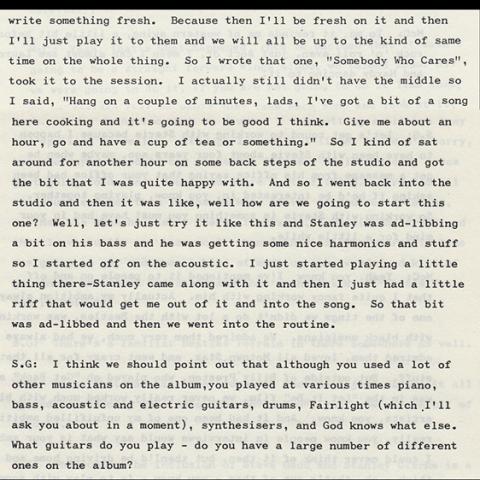
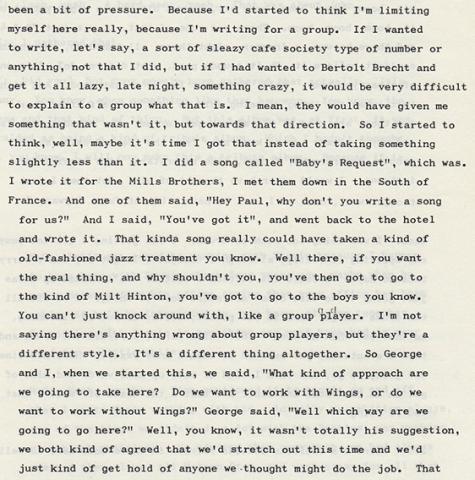
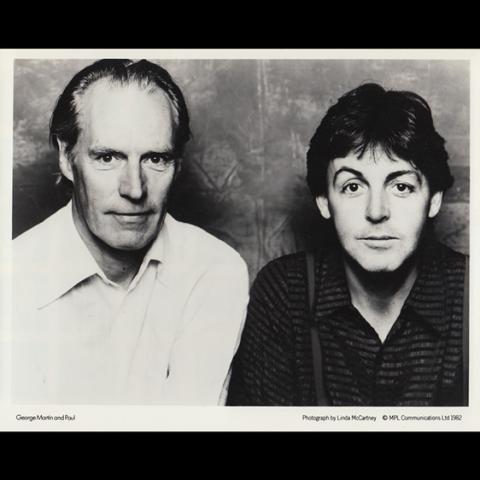
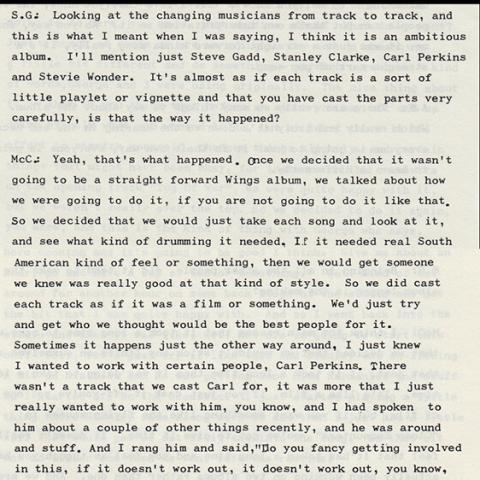
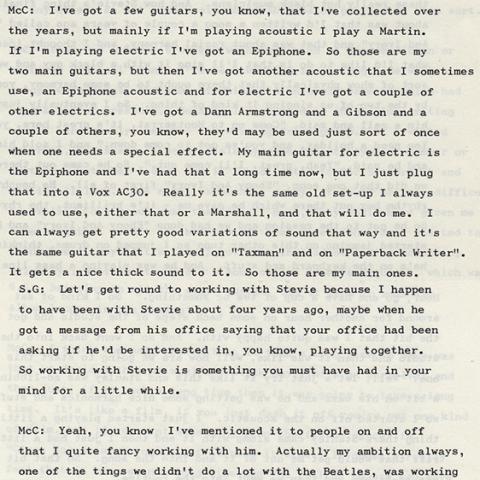
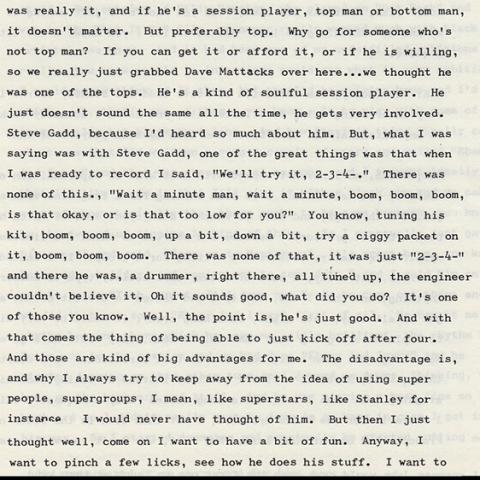
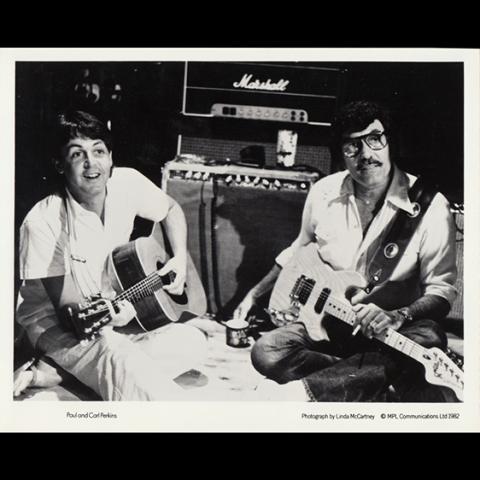

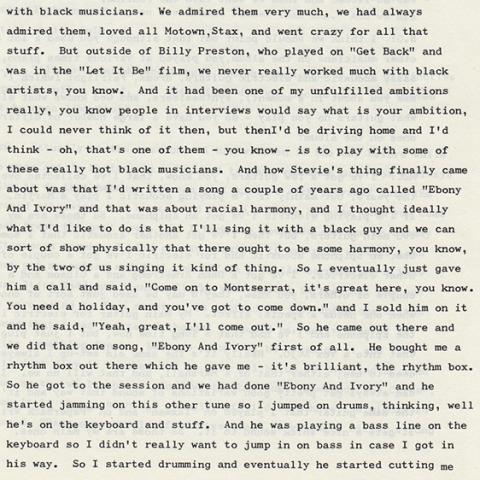
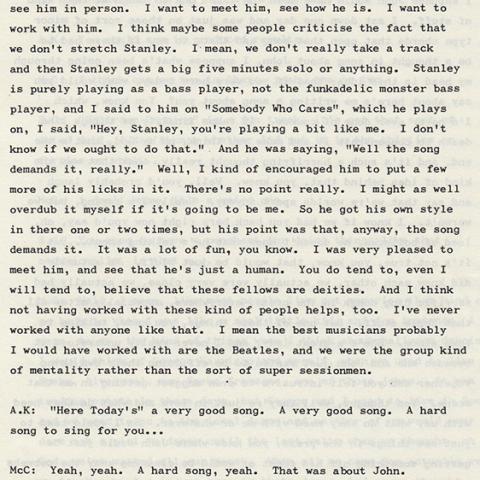
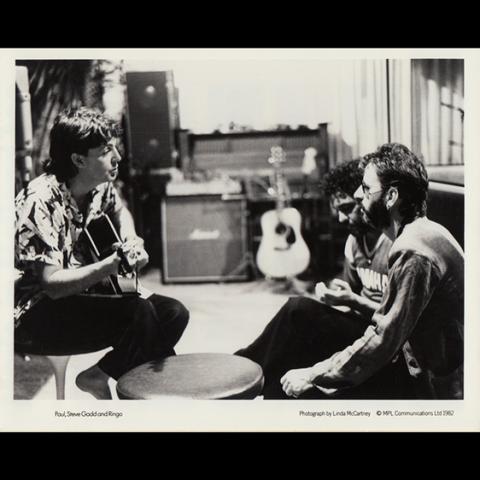
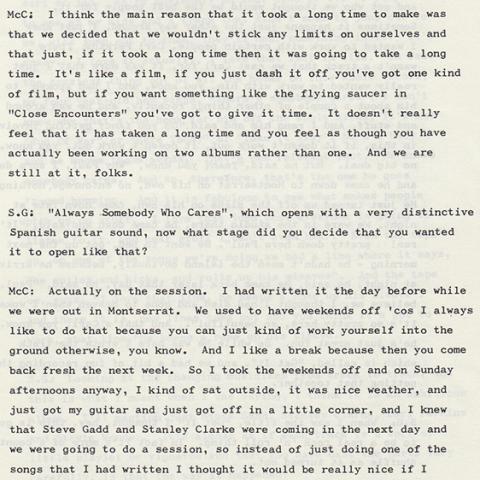
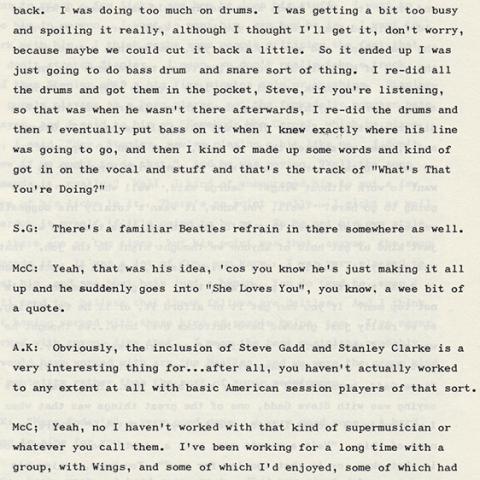
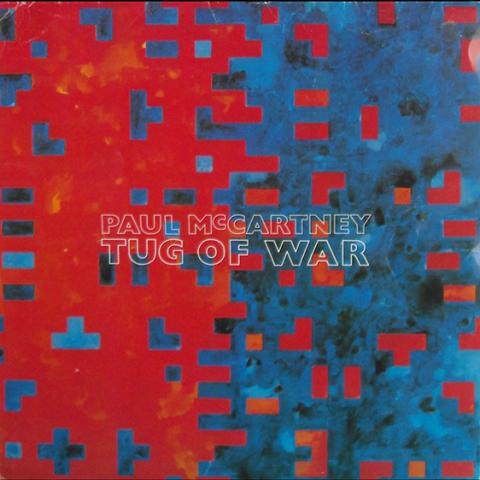
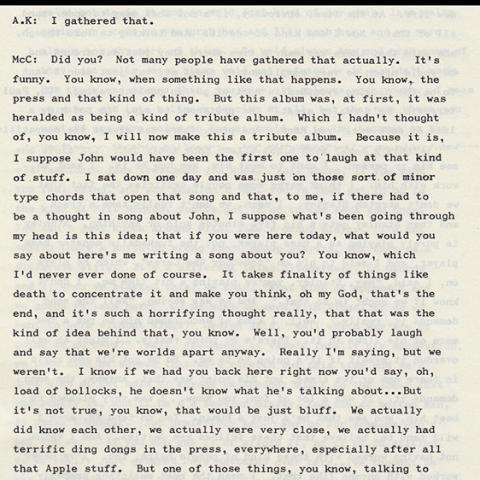
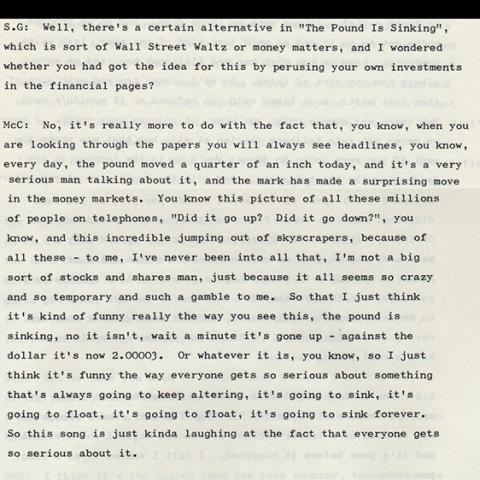
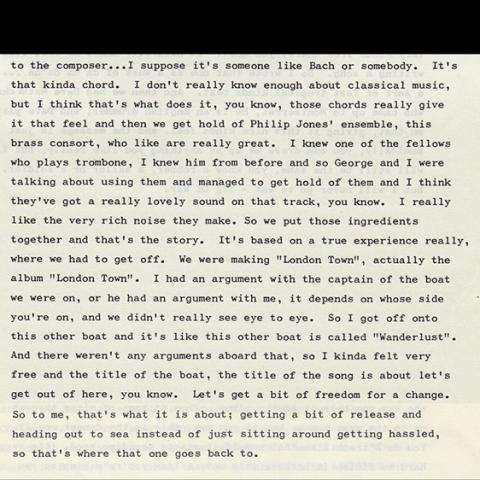

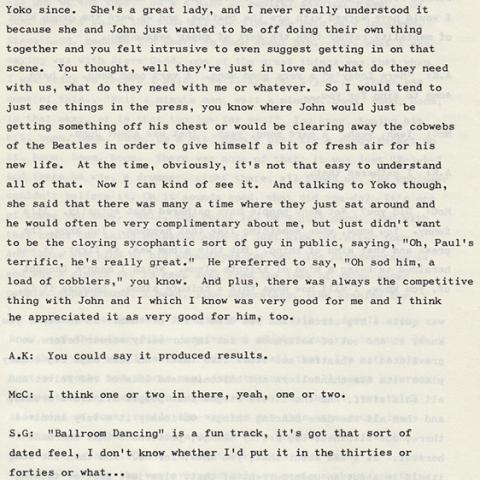
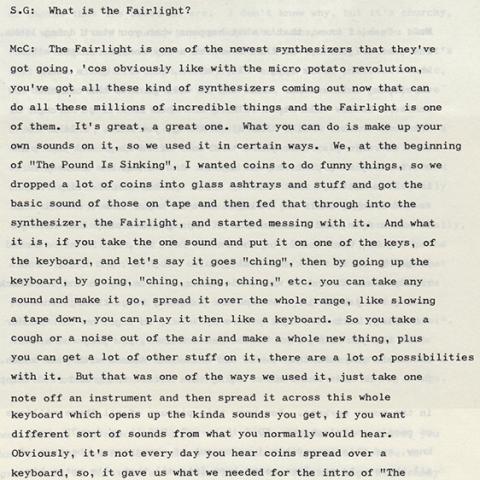
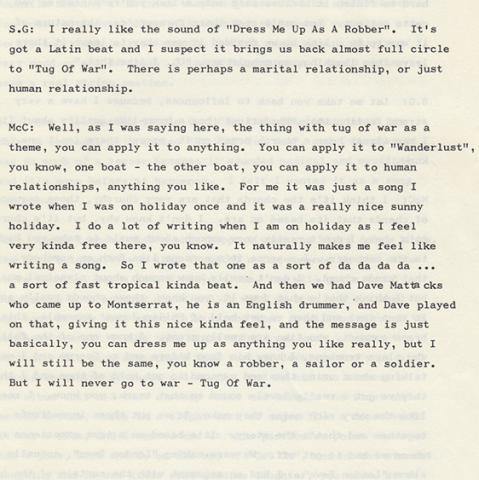
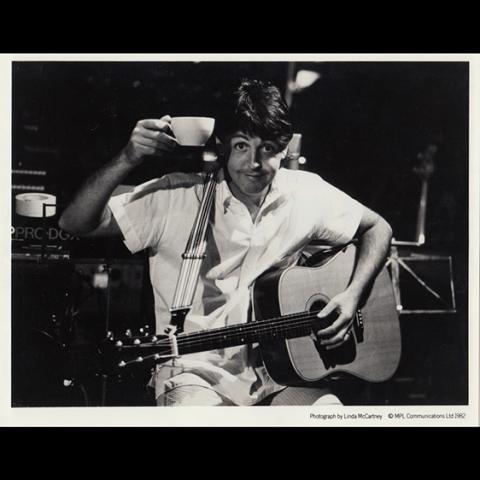
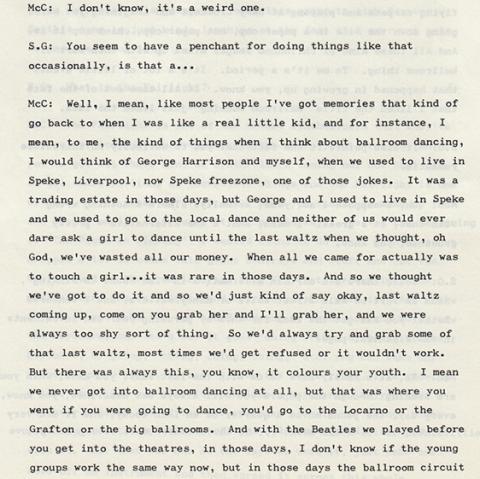
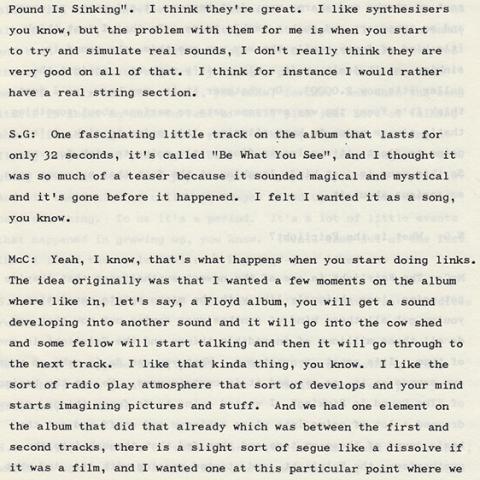
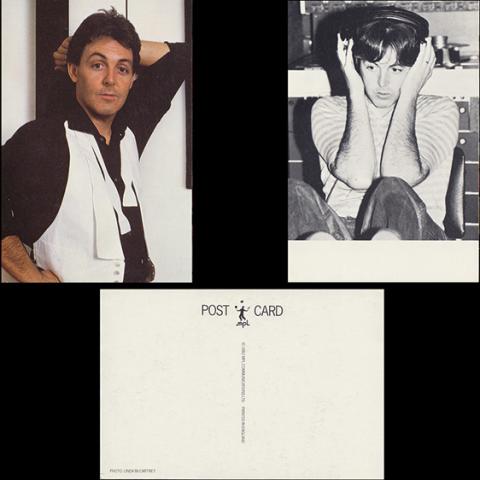
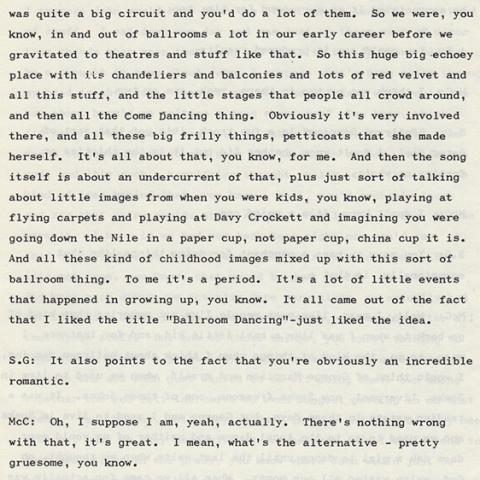

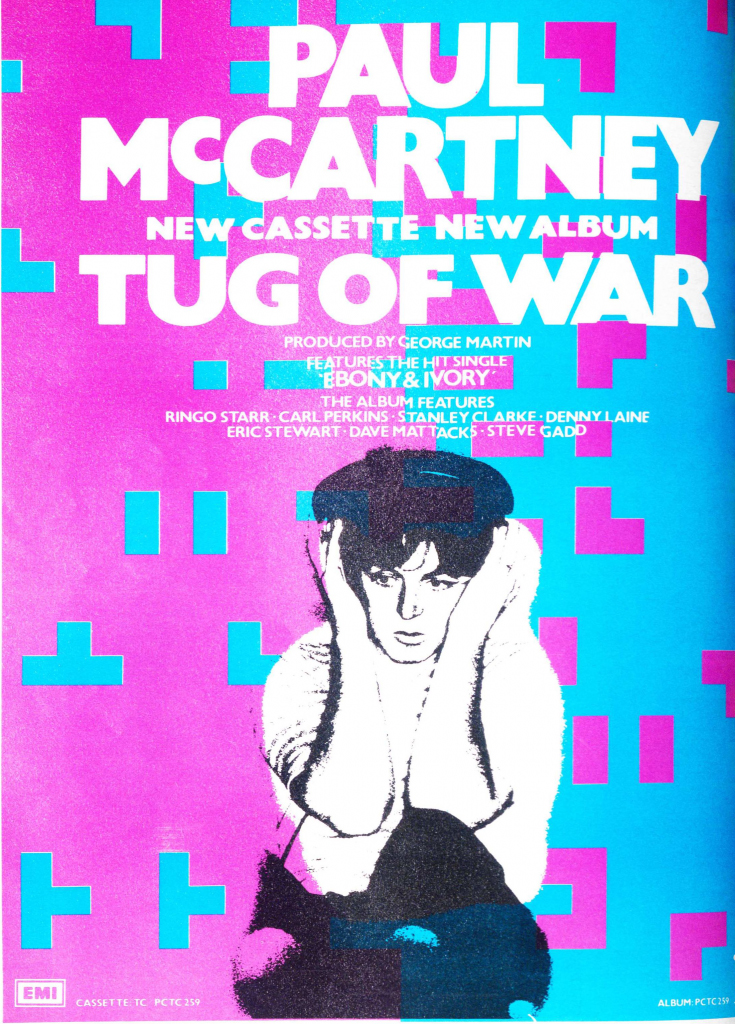

Notice any inaccuracies on this page? Have additional insights or ideas for new content? Or just want to share your thoughts? We value your feedback! Please use the form below to get in touch with us.